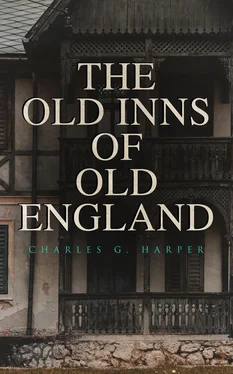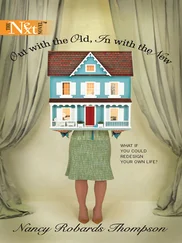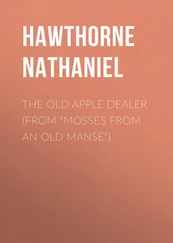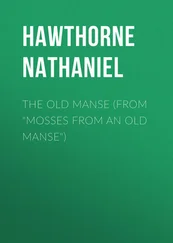For her viságe
It would aswage
A manne’s couráge.
Her lothely lere
Is nothyng clere,
But vgly of chere,
Droupy and drowsy,
Scuruy and lowsy;
Her face all bowsy,
Comely crynkled,
Woundersly wrynkled,
Lyke a rost pygges eare
Brystled wyth here.
Her lewde lyppes twayne,
They slauer, men sayne,
Lyke a ropy rayne:
A glummy glayre:
She is vgly fayre:
Her nose somdele hoked,
And camously croked,
Neuer stoppynge,
But euer droppynge:
Her skin lose and slacke,
Grayned like a sacke;
Wyth a croked backe.
Her eyen jowndy
Are full vnsoundy,
For they are blered;
And she grey-hered:
Jawed like a jetty,
A man would haue pytty
To se how she is gumbed
Fyngered and thumbed
Gently joynted,
Gresed and annoynted
Vp to the knockels;
The bones of her huckels
Lyke as they were with buckles
Together made fast;
Her youth is farre past.
Foted lyke a plane,
Legged lyke a crane;
And yet she wyll iet
Lyke a silly fet.
·····Her huke of Lincoln grene, It had been hers I wene, More than fourty yere; And so it doth apere. For the grene bare thredes Loke lyke sere wedes, Wyddered lyke hay, The woll worne away: And yet I dare saye She thinketh herselfe gaye. ·····She dryueth downe the dewe With a payre of heles As brode as two wheles; She hobles as a gose Wyth her blanket trose Ouer the falowe: Her shone smered wyth talowe, Gresed vpon dyrt That bandeth her skyrt.
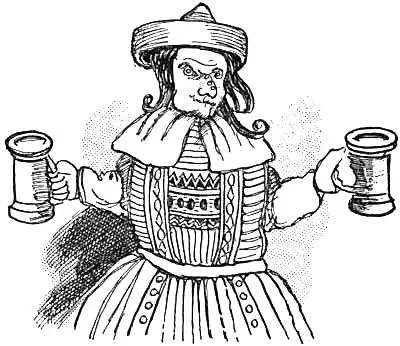
ELYNOR RUMMYNG.
And this comely dame
I vnderstande her name
Is Elynor Rummynge,
At home in her wonnynge:
And as men say,
She dwelt in Sothray,
In a certain stede
Bysyde Lederhede,
She is a tonnysh gyb,
The Deuyll and she be syb,
But to make vp my tale,
She breweth nappy ale,
And maketh port-sale
To travelers and tynkers,
To sweters and swynkers,
And all good ale-drynkers,
That wyll nothynge spare,
But drynke tyll they stare
And brynge themselves bare,
Wyth, now away the mare
And let vs sley care
As wyse as a hare.
Come who so wyll
To Elynor on the hyll
Wyth Fyll the cup, fyll
And syt there by styll.
Erly and late
Thyther cometh Kate
Cysly, and Sare
Wyth theyr legges bare
And also theyr fete.
·····Some haue no mony For theyr ale to pay, That is a shrewd aray; Elynor swered, Nay, Ye shall not beare away My ale for nought, By hym that me bought! Wyth, Hey, dogge, hey, Haue these hogges away[10] Wyth, Get me a staffe, The swyne eate my draffe! Stryke the hogges wyth a clubbe, They haue dranke up my swyllyn tubbe.
The unlovely Elynor scraped up all manner of filth into her mash-tub, mixed it together with her “mangy fists,” and sold the result as ale. It is proverbial that “there is no accounting for tastes,” and it would appear as though the district had a peculiar liking for this kind of brew. They would have it somehow, even if they had to bring their food and furniture for it:
Insteede of quoyne and mony,
Some bryng her a coney,
And some a pot wyth honey;
Some a salt, some a spoone,
Some theyr hose, some theyr shoone;
Some run a good trot
Wyth skyllet or pot:
Some fyll a bag-full
Of good Lemster wool;
An huswyfe of trust
When she is athyrst
Such a web can spyn
Her thryft is full thyn.
Some go strayght thyther
Be it slaty or slydder,
They hold the hyghway;
They care not what men say,
Be they as be may
Some loth to be espyd,
Start in at the backesyde,
Over hedge and pale,
And all for good ale.
Some brought walnuts,
Some apples, some pears,
And some theyr clyppying shears.
Some brought this and that,
Some brought I wot ne’re what,
Some brought theyr husband’s hat.
and so forth, for hundreds of lines more.
The old inn—still nothing more than an ale-house—is in part as old as the poem, but has been so patched and repaired in all the intervening centuries that nothing of any note is to be seen within. A very old pictorial sign, framed and glazed, and fixed against the wall of the gable, represents the ill-favoured landlady, and is inscribed: “Elynor Rummyn dwelled here, 1520.”
Accounts we have of the fourteenth-century inns show that the exclusive, solitary Englishman was not then allowed to exist. Guests slept in dormitories, very much as the inmates of common lodging-houses generally do now, and, according to the evidence of old prints, knew nothing of nightshirts, and lay in bed naked. They purchased their food in something the same way as a modern “dosser” in a Rowton House, but their manners and customs were peculiarly offensive. The floors were strewed with rushes; and as guests generally threw their leavings there, and the rushes themselves were not frequently removed, those old interiors must have been at times exceptionally noisome.
Inn-keepers charged such high prices for this accommodation, and for the provisions they sold, that the matter grew scandalous, and at last, in the reign of Edward the Third, in 1349, and again in 1353, statutes were passed ordering hostelries to be content with moderate gain. The “great and outrageous dearth of victuals kept up in all the realm by innkeepers and other retailers of victuals, to the great detriment of the people travelling across the realm” was such that no less a penalty would serve than that any “hosteler or herberger” should pay “double of what he received to the party damnified.” Mayors and bailiffs, and justices learned in the law, were to “enquire in all places, of all and singular, of the deeds and outrages of hostelers and their kind,” but it does not appear that matters were greatly improved.
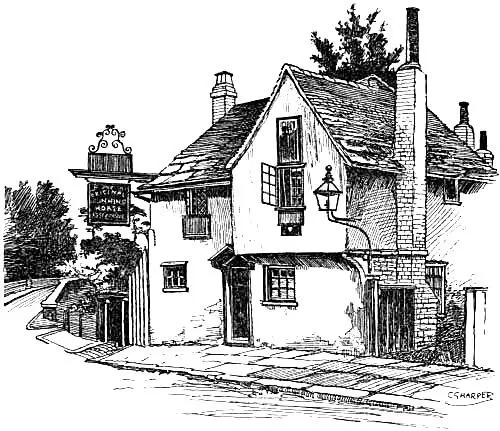
THE “RUNNING HORSE,” LEATHERHEAD.
It will be observed that two classes of innkeepers are specified in those ordinances. The “hosteler” was the ordinary innkeeper; the “herberger” was generally a more or less important and well-to-do merchant who added to his income by “harbouring”—that is to say, by boarding and lodging—strangers, the “paying guests” of that age. We may dimly perceive something of the trials and hardships of old-time travel in that expression “harbouring.” The traveller then came to his rest as a ship comes into harbour from stormy seas. The better-class travellers, coming into a town, preferred the herberger’s more select table to the common publicity of the ordinary hostelry, and the herbergers themselves were very keen to obtain such guests, some even going to the length of maintaining touts to watch the arrival of strangers, and bid for custom. This was done both openly and in an underhand fashion, the more rapacious among the herbergers employing specious rogues who, entering into conversation with likely travellers at the entrance of a town, would pretend to be fellow-countrymen and so, on the understanding of a common sympathy, recommending them to what they represented to be the best lodgings. Travellers taking such recommendations generally found themselves in exceptionally extortionate hands. These practices early led to “herbergers” being regulated by law, on much the same basis as the hostelers.
Читать дальше
